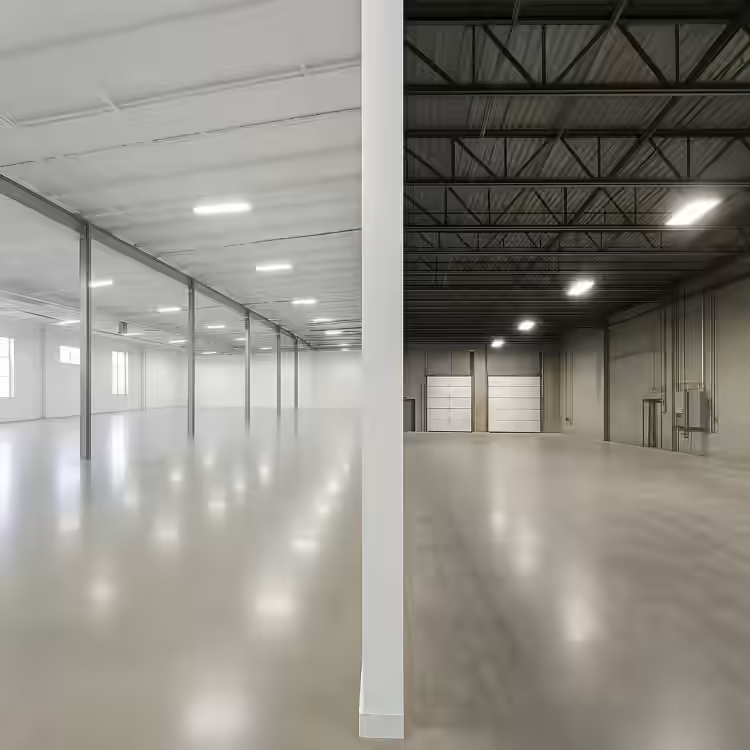Industrial Lease vs. Commercial Lease: What’s the Difference?
Why It Matters to Know the Difference
So you're ready to lease space for your business. Maybe you're launching a local distribution hub inPhiladelphia, or ramping up a light manufacturing operation near
Columbus. You start searching... and suddenly you're buried in listings labeled either “commercial” or “industrial.” What gives?
Here’s the catch: not all commercial leases are created equal. And an industrial lease? That’s a whole different beast. Whether you're a first-timer or expanding into new territory, understanding the core differences between these two lease
types can save you from costly missteps. Spoiler alert: The wrong space can tank productivity, violate zoning laws, or load you up with expenses you didn’t see coming.
What Is a Commercial Lease?
Let’s break it down. A commercial lease is a broad umbrella term. It covers almost any non-residential property used for business. That could include:- Office space in a downtown tower
- Retail shops in a strip mall
- Medical clinics, banks, or service providers
Common Features:
- Shorter-term leases (3–5 years)
- Maintenance often shared or included in rent
- Restrictions on usage (no fumes, noise, or heavy equipment)
- More emphasis on foot traffic, signage, and appearance
What Is an Industrial Lease?
Now, contrast that with an industrial lease. These are specialized agreements built for logistics, manufacturing, storage, or production. You’ll find them in warehouse parks, logistics hubs, and fringe zones — places likeFontana, California or
Garland, Texas, where zoning permits heavier activity.
Typical Industrial Tenants:
- 3PLs and logistics providers
- Manufacturers or assembly operations
- Wholesalers and import/export distributors
- Contract packaging or cold storage companies
- High ceilings (20+ ft)
- Dock-high or grade-level loading bays
- Heavy-duty flooring and utility access
- Zoned for industrial activity (noise, emissions, large trucks)
Major Differences to Watch
Let’s put them side-by-side. Here’s how commercial and industrial leases really differ:| Feature | Commercial Lease | Industrial Lease |
|---|---|---|
| Use Type | Office, retail, service | Warehouse, manufacturing, logistics |
| Location | Urban, retail centers, office parks | Industrial parks, near transport routes |
| Buildout | Finished interiors, HVAC, amenities | Open floor plans, minimal finish, functional |
| Lease Length | 1–5 years | 3–10 years |
| Who Maintains? | Usually landlord | Often tenant (triple net) |
| Cost per Sq Ft | Higher (due to finishes & location) | Lower, but with more tenant responsibilities |
It’s not just apples and oranges. It’s more like an apple... and a forklift.
Which One Do You Need?
That depends entirely on your business model.Pick a Commercial Lease If You:
- Serve walk-in customers or clients regularly
- Need polished, branded space (showroom, consulting office)
- Want a short-term lease with fewer tenant responsibilities
- Operate in a low-impact, low-noise business
Pick an Industrial Lease If You:
- Need loading docks, forklifts, or bulk storage
- Run heavy equipment or require 3-phase power
- Ship or receive large volumes of goods
- Can manage maintenance or prefer full control
How to Negotiate the Right Lease
Once you’ve picked your lane — commercial or industrial — it’s time to get serious about negotiation.Here’s where to focus:
1. Understand Who Covers What
In industrial leases, tenants often handle more: HVAC, roofing, landscaping, even structural upkeep. Commercial leases tend to push that to landlords. Read. Every. Clause.2. Ask About Zoning
Just because a space *looks* right doesn’t mean it’s zoned for your use. Cities likePortland or
Charlotte have strict zoning overlays — make sure your operation is compliant.
3. Review CAM Charges
Both lease types may include Common Area Maintenance (CAM) fees. But how they’re split — and what’s included — varies wildly.4. Don’t Overcommit on Term
Yes, industrial leases are longer — but that doesn’t mean you can’t negotiate early-out clauses, expansion options, or renewal flexibility.5. Get a Broker
Industrial real estate is its own language. A good tenant rep can break it down, find comps, and avoid rookie mistakes.Final Thoughts: Know Before You Sign
Here’s the bottom line: the wrong lease isn’t just a paperwork problem. It can stall your business before it even gets off the ground.Picking between a commercial lease and an industrial lease isn’t about what’s cheaper or shinier. It’s about fit. If your operation revolves around movement, machinery, or bulk goods — industrial space is probably your arena. If you're building
a customer-facing brand or service? Go commercial. The right lease gives you room to grow. The wrong one? It’s a headache with monthly payments. So take the time, ask questions, and don’t assume all “commercial” spaces are the same. Because when it
comes to leases — details aren’t just details. They’re the whole deal.

